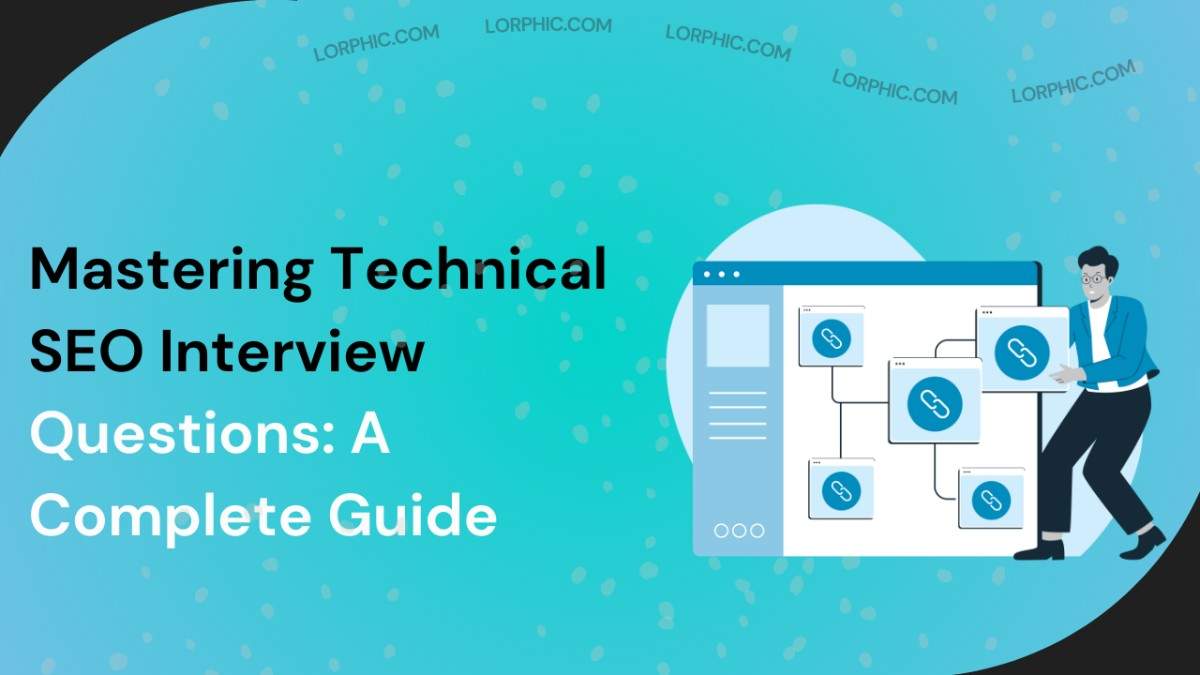Landing your dream SEO job today takes more than just knowing keywords or writing good content. Companies now expect candidates to understand technical SEO, the behind-the-scenes factors that help a website perform well in search engines. That’s why many hiring managers focus heavily on technical SEO skills during the interview process.
In this guide, we’ll walk through the most common technical SEO interview questions and answers you’re likely to face in 2025. Whether you’re applying as an SEO specialist, a digital marketer, or even a web developer with SEO responsibilities, these examples will help you feel confident and ready.
Technical SEO interviews are designed to test how well you can solve real-world problems, from crawling and indexing issues to site speed and structured data. By preparing for these questions, you’ll not only perform better in your interview but also strengthen the skills you’ll use every day in your role.
What is Technical SEO?
Technical SEO is all about improving the backend structure of a website so search engines like Google can easily crawl, index, and understand your content. It goes beyond keywords and backlinks, it’s the foundation that makes every other SEO strategy work effectively.
Unlike on-page SEO (which focuses on optimizing content) or off-page SEO (like link building), technical SEO deals with elements such as:
- Site speed and Core Web Vitals
- Mobile-friendliness and responsive design
- Clean URL structures
- Internal linking
- Schema markup (structured data)
- Server performance and security (HTTPS)
A strong technical setup ensures search engines can properly access and evaluate your website, while also giving users a faster, smoother experience. Without it, even the most valuable content might fail to rank.
Today’s search engines are more advanced than ever, factoring in both content quality and technical performance. That’s why candidates preparing for a technical SEO interview should master these areas. Websites with solid technical SEO foundations consistently achieve higher visibility, better user engagement, and stronger conversion rates.
Why Technical SEO Questions Matters in Interviews?
In a technical SEO interview, the questions aren’t just about theory, they’re designed to show how well you can solve real-world problems. Employers want to know if you can spot issues, fix them effectively, and explain technical concepts clearly to teammates who may not have an SEO background.
These technical SEO interview questions also highlight your ability to collaborate with developers, understand website architecture, and prioritize fixes that actually drive results. It’s not enough to just create content or research keywords; companies are looking for candidates who can improve site speed, fix crawl errors, and make sure every part of the site is optimized for both users and search engines.
That’s why technical SEO has become a core part of interviews. Businesses know that stronger technical foundations lead to higher rankings, faster websites, better user experience, and ultimately, more revenue. By preparing for these technical SEO interview questions and answers, you can show that you’re not just an SEO specialist, but a problem-solver who impacts the bottom line.
Top 13 Technical SEO Interview Questions 2025 (With Answers)

What is the difference between crawling and indexing?
Crawling is when search engine bots discover and scan web pages by following links. Indexing occurs after crawling, where search engines analyze, process, and store page content in their database. Pages must be crawled before indexing, but crawled pages aren’t automatically indexed if they lack quality or relevance.
What are Core Web Vitals and why do they matter?
Core Web Vitals measure user experience through three key metrics: Largest Contentful Paint (loading), First Input Delay (interactivity), and Cumulative Layout Shift (visual stability). Google has been using these as ranking factors since 2021. Good Core Web Vitals scores improve search rankings, user satisfaction, and conversion rates significantly.
What are hreflang tags and when are they used?
Hreflang tags help search engines understand which language and regional version of a page to show users. They’re essential for international websites with multiple language or country versions. Proper implementation prevents duplicate content issues and ensures users see content in their preferred language and location.
What is the importance of XML sitemaps?
XML sitemaps help search engines discover and crawl website pages more efficiently. They’re especially valuable for large sites, new websites, or pages with few internal links. Sitemaps should include only canonical, indexable URLs and be updated regularly to reflect site changes and new content.
How can you optimize website loading speed?
Key speed optimizations include compressing images, minifying CSS/JavaScript, enabling browser caching, using content delivery networks (CDNs), optimizing server response times, and eliminating render-blocking resources. Tools like PageSpeed Insights and GTmetrix help identify specific improvements. Faster sites improve user experience and search rankings.
What are the best practices for mobile optimization?
Mobile optimization requires responsive design, fast loading times, touch-friendly navigation, readable fonts without zooming, and proper viewport configuration. Google uses mobile-first indexing, making mobile optimization crucial for rankings. Test using Google’s Mobile-Friendly Test and ensure consistent functionality across all devices and screen sizes.
What is Schema Markup, and How Does Structured Data Improve SEO?
Schema markup is structured data code that helps search engines understand page content better. It can generate rich snippets, knowledge panels, and enhanced search results. Common schema types include articles, products, reviews, and local businesses. Proper implementation can significantly improve click-through rates from search results.
Why is HTTPS Important for Website Security and SEO?
HTTPS encrypts data transmission between users and websites, protecting sensitive information. Google confirmed HTTPS as a ranking factor and Chrome marks HTTP sites as “not secure.” HTTPS is also required for many modern web features like service workers and Progressive Web Apps (PWAs).
What is the difference between no-index and disallow?
Disallow (robots.txt) prevents search engine crawling but doesn’t stop indexing if other sites link to the page. No-index allows crawling but prevents indexing and search result appearance. Use disallow for crawl budget optimization and no-index when you want to block pages from search results completely.
What are log file analyses in SEO?
Log file analysis examines server logs to understand search engine bot behavior, including crawl frequency, status codes, and crawled URLs. This data reveals technical issues like crawl errors, wasted crawl budget, and pages search engines can’t access. It’s essential for large sites and technical audits.
How do you handle duplicate content issues?
Handle duplicates through canonical tags, 301 redirects, parameter handling in Search Console, and robots.txt blocking. Identify duplicates using crawling tools, then implement the most appropriate solution based on whether duplicates are intentional (canonicals) or should be eliminated (redirects). Monitor for new duplicate creation.
What are orphan pages and how do you fix them?
Orphan pages have no internal links pointing to them, making them difficult for users and search engines to discover. Find orphans by comparing crawled URLs with sitemap URLs. Fix by adding internal links from relevant pages, updating navigation menus, or removing pages if they’re unnecessary.
What are the most common technical SEO issues you’ve solved?
Common issues include crawl errors, slow page speed, mobile usability problems, broken internal links, improper canonical implementation, and indexation issues. I use Search Console, crawling tools, and site audits to identify problems, then prioritize fixes based on potential traffic impact and implementation difficulty.
Final Thoughts
Mastering technical SEO is no longer optional, it’s a must-have skill for SEO professionals at every stage of their career. The technical SEO interview questions you’ll face aren’t just theoretical; they reflect real challenges you’ll deal with on the job. That’s why preparation is key, not only for landing the role but also for building long-term success in your career.
Instead of memorizing answers, focus on truly understanding the principles behind each concept. Interviewers often dig deeper with follow-up questions to see how you think, troubleshoot, and apply SEO strategies in real-world situations. The best way to stand out is to combine strong technical knowledge with hands-on practice and examples from your own experience.
Finally, remember that technical SEO is always evolving. Search engine algorithms, Core Web Vitals, structured data, and web technologies keep changing, and the strongest candidates show curiosity and adaptability. Demonstrating a commitment to continuous learning not only makes you interview-ready but also shows you’re prepared to grow with the industry.




